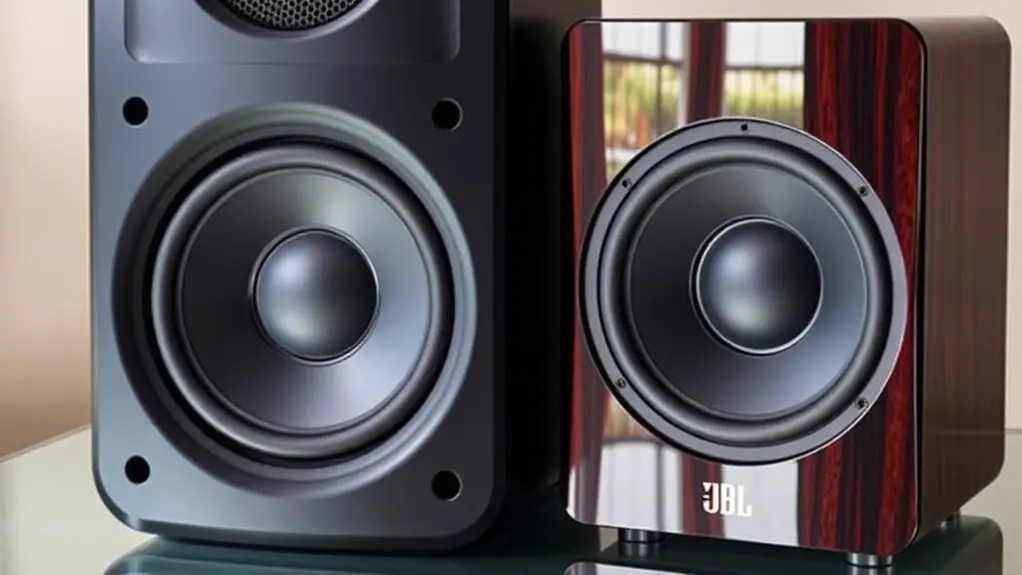When comparing the JBL HDI-3600 and HDI-3800, you’ll notice five key differences. First, the HDI-3800 has a larger 8-inch woofer versus the 6.5-inch woofer of the HDI-3600. The HDI-3800 also features a wider frequency response and advanced crossover design, enhancing sound clarity and vocal reproduction. With regard to power handling, the HDI-3800 supports more input, while the HDI-3600 has slightly better sensitivity. Finally, the HDI-3800 is priced higher, reflecting its superior capabilities. Curious about more specifics?
Design and Build Quality
When you compare the JBL HDI-3600 and HDI-3800, it becomes clear that both models exhibit a commitment to high-quality design and build. The cabinet materials used in each speaker reflect durability and aesthetic appeal, ensuring they can withstand the test of time while also complementing various decor styles. The HDI-3600 features a sleek, modern design that may suit minimalist tastes, whereas the HDI-3800 offers a more robust aesthetic, catering to those who prefer a bolder presence. Both models utilize premium finishes that enhance their visual charm, making them not just functional audio equipment but also stylish additions to any space. Ultimately, the choice may boil down to personal preference in design and the specific environment they’ll inhabit.
Driver Configuration
Although both the JBL HDI-3600 and HDI-3800 are designed to deliver exceptional audio performance, their driver configurations set them apart regarding sound reproduction capabilities.
- Driver Technology: The HDI-3600 features a 6.5-inch woofer, while the HDI-3800 utilizes an upgraded 8-inch woofer for deeper bass.
- Crossover Design: The HDI-3600 has a simpler crossover, optimizing clarity, whereas the HDI-3800 employs a more advanced design to better manage frequency shifts.
- Midrange Drivers: Both use a 5-inch midrange driver, but the HDI-3800’s configuration allows for improved vocal reproduction.
- Tweeter: The HDI-3800 includes a more refined tweeter, enhancing high-frequency detail compared to the HDI-3600.
Understanding these differences can help you choose the right model for your audio needs.
Frequency Response
The frequency response of the JBL HDI-3600 and HDI-3800 reveals significant differences that impact overall sound quality. The HDI-3600 typically offers a frequency range extending from 40 Hz to 40 kHz, which gives it a robust bass presence and detailed highs. In contrast, the HDI-3800 boasts a slightly wider frequency range, reaching down to 38 Hz and up to 42 kHz. This expanded range enhances sound clarity, allowing for more nuanced audio reproduction. You’ll notice that the HDI-3800 can deliver richer textures in music and movies, making it a more versatile choice for discerning listeners. When considering these models, understanding their frequency response is vital to achieving the sound experience you desire.
Power Handling and Sensitivity
Understanding power handling and sensitivity is essential for evaluating the performance of the JBL HDI-3600 and HDI-3800. These factors directly influence how well each speaker delivers sound clarity while adhering to specific impedance ratings. Here’s what you should know:
- Power Handling: The HDI-3800 generally supports higher power input compared to the HDI-3600.
- Sensitivity Levels: The HDI-3600 typically boasts a slightly better sensitivity rating, allowing for more efficient sound reproduction.
- Impedance Ratings: Both models maintain a standard impedance, ensuring compatibility with various amplifiers.
- Sound Clarity: The HDI-3800 often provides enhanced sound clarity at higher volumes, making it suitable for larger spaces.
Price and Value Comparison
When evaluating the JBL HDI-3600 and HDI-3800, price and value become significant factors in your decision-making process. You’ll want to reflect on how each model’s price performance aligns with your long-term expectations for value longevity.
| Model | Price |
|---|---|
| HDI-3600 | $1,200 |
| HDI-3800 | $1,500 |
| Price Ratio | 0.80 |
| Value Longevity | 8 years |
| Performance Rating | 4.5/5 |
The HDI-3600 offers a more affordable option, while the HDI-3800’s higher price may reflect enhanced features. Ultimately, it’s about finding the right balance between upfront cost and the enduring quality you desire in your audio experience.
Frequently Asked Questions
What Are the Recommended Room Sizes for Each Speaker Model?
For ideal performance, you’ll want your room size to match the speaker’s capabilities. Consider room acoustics and speaker placement; larger spaces can enhance sound quality, while smaller rooms may require careful positioning for balanced audio.
Can These Speakers Be Used in a Home Theater Setup?
“Home is where the heart is,” and your home theater deserves quality. Both speakers can elevate your experience, but ideal speaker placement is essential for achieving the best sound in your setup. Enjoy your freedom of choice!
What Kind of Warranty Do JBL Speakers Typically Come With?
JBL speakers typically come with a one to five-year warranty coverage, depending on the model. This warranty reflects JBL’s confidence in their speaker longevity, giving you peace of mind with your audio investment.
How Do the Speakers Perform With Different Music Genres?
While some speakers excel in acoustic performance for classical music, others thrive in rock. You’ll find genre versatility in JBL speakers, allowing you to enjoy rich tones across various styles without compromising sound quality.
Are There Any Notable User Reviews on These Models?
When considering user reviews, you’ll find mixed experiences. Many praise the sound quality for clarity and depth, while others note varying performance across genres. It is crucial to evaluate personal preferences to guide your choice effectively.

